MercoPress. South Atlantic News Agency
Tag: Venezuela inflation rate
-
Thursday, August 2nd 2018 - 07:35 UTC
Santos convinced that Maduro's days in Venezuela are numbered, “in the near future”
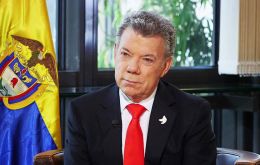
Nicolas Maduro's days as president of crisis-ravaged Venezuela are numbered, his outgoing Colombian counterpart Juan Manuel Santos told the French government news agency.“I can see it happening in the near future,” said Santos, pointing to the International Monetary Fund's latest projection that Venezuela's inflation will hit one million percent this year.
-
Friday, July 27th 2018 - 14:38 UTC
Venezuela: “opposition accomplice” on a way to a million percent inflation
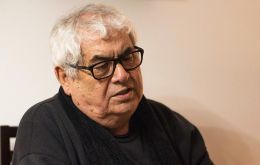
The speed of economic events in Venezuela limits the possibility of conserving any forecast in the national economy for a long time. And it is that the economic instability in the Caribbean country accelerates as its own inflation against the unproductively of the state oil company, PDVSA.
-
Saturday, March 17th 2018 - 16:55 UTC
Transparency International denounces “Venezuelan apartheid”
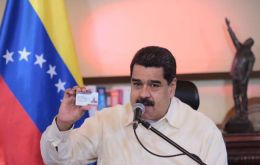
NGO Transparency Venezuela denounced through a follow-up that the Carnet de la Patria (homeland card), identity document devised by the government of Nicolás Maduro, is a tool of social control that seeks, among other purposes, the loyalty to the ruling party at the polls.
-
Monday, January 29th 2018 - 18:29 UTC
“Electoral charade”: Maduro clings to power at all costs
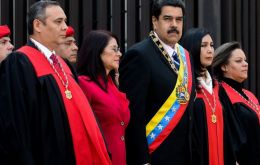
On December 20 the National Constituent Assembly (ANC) - formed only by pro-government officials - decreed that political parties that did not participate for the last regional election a few months ago must be revalidated before the National Electoral Council (CNE), a rule that according to the the current constitution should be should be applied when absenting more than 3 times to the suffrages.
-
Friday, December 22nd 2017 - 23:09 UTC
Venezuela's shortage of cash means big business for some
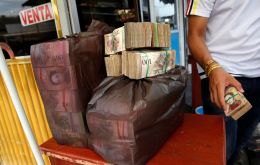
In view of the hyperinflation in their country, Venezuelans have developed “creative” forms of business.
-
Monday, December 19th 2016 - 09:55 UTC
Maduro backtracks on elimination of 100-bolivar bill as looting erupts
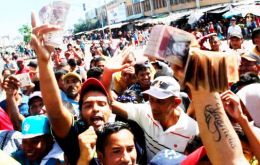
Venezuela's President Nicolas Maduro reversed his decision to ban from circulation the 100-bolivar bill and gave the notes, which are worth between US$ 0.02 and 0.04 according to varying quotations, a two-week grace. The bills can now be used until January 2, Maduro said.
-
Tuesday, December 13th 2016 - 10:23 UTC
Chaos in Venezuela: bills and coins pulled out of circulation to combat hyperinflation
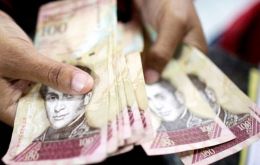
Venezuelans hastily dumped the country's 100-bolivar bill, the largest denomination, on Monday after the government said it would be pulled from circulation as the crisis-racked nation suffers what is believed to be the world's highest inflation. Populist president Nicolas Maduro said the withdrawal of the bill — worth just 2 U.S. cents on the black market — was needed to reduce contraband of the banknotes on the Venezuela-Colombia border.
-
Wednesday, October 21st 2015 - 06:35 UTC
Venezuela presents 2016 budget based on a US$40 per barrel estimate
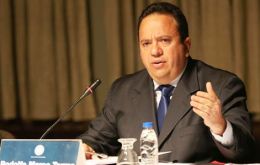
Venezuela's proposed 2016 government budget is based on an estimate of $40 per barrel for the OPEC nation's oil exports, Finance Minister Rodolfo Marco said in a presentation to congress on Tuesday.
-
Wednesday, February 18th 2015 - 04:28 UTC
Venezuela ready to address fuel prices: “piece of candy cannot cost more than a liter of gasoline”
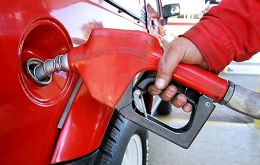
Venezuelan Finance minister Rodolfo Marco Torre announced that ”soon there will be important announcements on the issue of gasoline”, underlining that “a piece of candy cannot cost more than a liter of gasoline”.
-
Saturday, March 15th 2014 - 04:26 UTC
February annual inflation in Venezuela soars to 57.3%; Maduro blames the 'economic war'
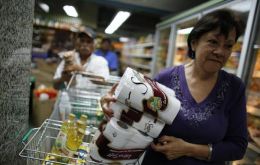
Venezuela's annual inflation rate rose to 57.3% in February, the central bank said as violent opposition demonstrations during the month disrupted the economy. However the bank also pointed out that despite the protests inflation slowed on a month-on-month basis to 2.4% from 3.3% in January.
